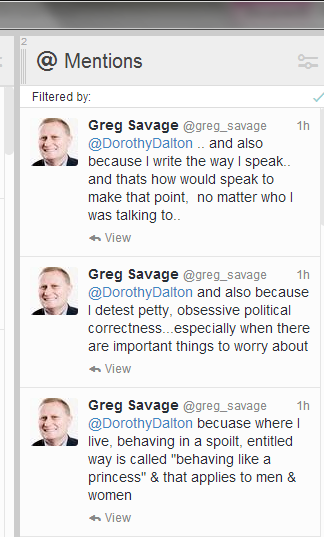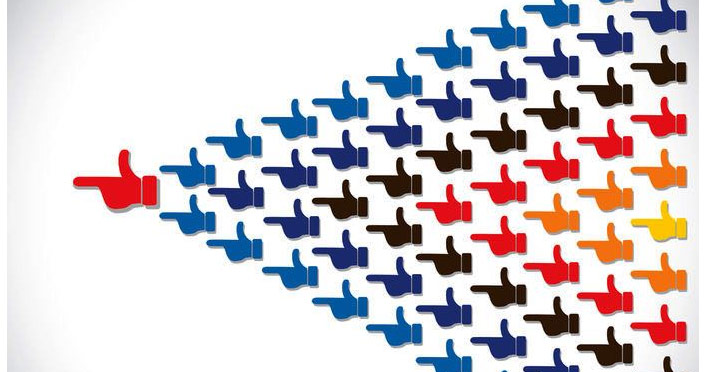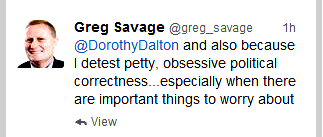I am a huge tennis fan as many of you know, but was disappointed to turn on my television yesterday to see John Inverdale commentating on the Davis Cup match Italy versus Great Britain. Inverdale ignited a furore last year after the Wimbledon final when he suggested to an audience of millions, that because the new champion Marion Bartoli “was never going to be a looker,” tennis would have been one of her few options as a way forward. She was the one holding the trophy of course and despite some rapid back tracking, he was left with some serious egg on his face and reportedly facing the B.B.C. axe. However, it would appear he is still doing his job despite all the brouhaha. What message does this send out?
The power of leadership language
Unconscious bias, whether related to gender, race, appearance or age, is considered to be one of the most significant “known unknowns” in our cultures today, simply because it is so difficult to measure. One area where is it very self-evident in language usage. Our leaders whether male or female play a pivotal role in the gender balance and diversity policies of our organisations and wider cultures. It’s therefore important that public figures in whatever domain, lead by example. Their behaviour and language choice will be a key component in influencing public thinking and viewpoints to overcome subconscious bias which can exist in all of us.
“Example is not the main thing in influencing others. It is the only thing.” Albert Schweitzer
Ilene Lang CEO of catalyst talks about benevolent sexism saying “these benevolent stereotypes hurt women because they maintain inequality. Whether she’s the “little lady” or the “woman behind the man” or the soothing creature who exists simply to make men nicer, woman’s “natural” goodness becomes a rationale for why she should be protected from activities and occupations that require stereotypically “macho” qualities.”
In the workplace, all sexism and any sort of stereotyping whether, unintentional, overt, hostile or benevolent, acts as a barrier to prevent women and others fully contributing. The perpetuation of outdated views about women’s role and place in our current society is a strong factor.
Recruitment processes
In talent management where executive search and coaching contribute to the same degree the example of leaders is vital. After all it’s hard for women be” what they can’t see, read and hear.” Having open, bias free recruitment processes is a significant driver to achieving the appointment of the best candidates, whether male or female. It is surely the only way forward and therefore important that all leaders in the search and recruitment field play a role to achieve this.
I am constantly hearing about illegal questioning of women about their family circumstances a direct reflection of unconscious bias. All women want children and are therefore flight and engagement risks, right? I heard only yesterday how Salma an advertising executive was quizzed about how she would cope with a job and her five month baby. She suggested to the interviewer that the line of questioning was as appropriate as her asking him about his sex life. She was offered the job and turned it down. Not everyone is unconcerned about jeopardising their job search options. Another contact, a woman with no children in her early 50s, (in the full throes of the menopause to boot) was also asked about her family situation. The interviewer had no idea of her personal background and any extenuating circumstances. She should have registered a complaint, but she didn’t.
The recruitment process is the first experience a candidate has of an employer brand and is vital that everyone involved is correctly trained in today’s legal requirements and expectations which involves being politically correct, defined by Merriman Webster as:
conforming to a belief that language and practices which could offend political sensibilities (as in matters of sex or race) should be eliminated
Political correctness
In a recent exchange on Twitter, Greg Savage took me to task for my own ” political correctness” when I queried a post title “Suck it up princess. This as good as it gets”. I asked him quite mildly to be fair “Why not prince?” He responded thus:
Political correctness actually plays an important role. Yes, it can be tiresome to have to focus on changing our speech patterns which will go on to impact our subsequent thought and action patterns. It means we indeed have to think and let go of our old ways. This role and adherence to “political correctness” has finally succeeded in outlawing words like “nigger”, “Paki” and ” faggot” and a host of other pejorative terms that used to be in the daily common vernacular of most cultures. These words are now considered to be socially unacceptable and rarely heard in professional circles, or at least the ones I move in.
Language shapes how we feel and react. It’s a key pillar in the culture of change. The number of new words making the Oxford English dictionary every year is phenomenal. As we embrace the new, so we also easily let go of the old. It might take a while but people are pretty adaptable in this regard I find.
However the process also needs strong leadership. And leaders, especially those representing their organisation externally, whether in the hiring process any other way, or anyone at all in the public eye do have to ” watch their language.” All of this contributes to unconscious bias.
What do you think – does leadership language matter?
April 12th Addendum
In the interests of transparency following comments from Greg Savage (see below), please see the full Twitter thread. 







Dorothy, is not true that the tweet you repost from our exchange above was my SECOND tweet in reply to your comment? Indeed does this tweet not begin “and also”…?
I wonder why you did not post my actual primary answer to your question? Was it to make a point that was more difficult to make if you did not post the entire conversation?
Comparing my words to such disgusting phrases as “faggot” and nigger” is insulting in the extreme. Those words were never political correct or incorrect. They were always just appalling examples of lack of tolerance and mindless hate. Its obsessive, petty political correctness for its own sake I find tiresome.. and any suggestion that I condone racial or any other kind of bigotry is extremely offensive to me, and I ask you to watch what you write.. carefully.
I am totally comfortable in my use of language here and everywhere. I represent only me. You might need to take more stock of what you write in the public forum however.
Hi Greg – thanks for your comment. There was no intention to insult you at all and I apologise if you feel that way. I am an avid reader of your posts and a great supporter of your thinking as you well know. I have also made this clear in the public domain.
The tweet I quoted was indeed the second and I used it only to illustrate how you took me to task for “petty, obsessive political correctness” also in the public domain.
30-50 years ago the words I quoted were not considered to be particularly insulting, they were inbuilt into our culture and commonly used along with others which are possibly worse. Today of course they are not acceptable. My school uniform was “nigger brown” and Robertson’s gave “Golliwog” badges away with marmalade. Homosexuality was illegal in the U.K. until 1967. I was not inferring in any way either directly or indirectly that you would condone those terms.
Unconscious bias is built up from a myriad of genuinely throw away remarks and becomes embedded in our culture. The point I wanted to make is that political correctness, tiresome though it can be, does contribute to social change.
It was not intended to be personal, but about collective unconscious bias.
Dorothy you are wrong. I did not “take you to task” for anything at all. You asked me a question as to why I did not use the term “prince”. I told you why in two tweets. I needed two tweets because one tweet is 140 characters as you know. None of what i said was directed at you. It was an honest answer to your direct question. Which I stand by now. Using the word “prince” in the context I was writing , would have been ludicrous. A piece of silly puffery driven by nonsensical ‘correctness’.
May I ask, had you actually read the blog, before you made your initial comment? Have you read it yet or was the headline enough for you to form your view? There is no hint of sexism in that article, In fact I believe I go out of my way to make sure its clear I am referring to men and women.
While no proof that your entire position is overstated, it is true that tens of thousands of people have read that blog with you being the only person to take this view.
What is without doubt is you manipulated our exchange, leaving out part of it, to make your point. It’s not your point of view I have a problem with. Its the spin you used to make it. That was poor form, by any measure. I will leave it at that Dorothy, and of course wish you well and thank you for reading my content at all.
Greg – It was not my intention to manipulate your position. I have posted the whole thread as an addendum to put your mind a rest. The first and third tweet for the purpose of this post were not relevant. I had indeed read your post and didn’t think there was any sexism in it, and have not said or implied that at any point.
My post focused on one element only – political correctness and the value it has, specifically with dealing with culturally embedded unconscious bias via language selection rather than the content. Ascribing “spoilt entitled behaviour” a female noun for me falls into that category. You don’t have the same opinion. So we will agree to differ. Maybe I am indeed a lone voice.
Your tweet referencing your dislike of “petty, obsessive political correctness” was addressed to me personally and I received it as being taken to task.
Political correctness can be annoying, but it is absolutely necessary for us to unlearn ingrained behaviour and vocabulary. It takes a while but it will eventually filter into mainstream culture. There is always resistance “this is what I’ve always done”, “this is the way I am” or “I don’t mean anything by it.”
It’s not just language, but images as well that contribute to the way women and others are portrayed and therefore perceived and ultimately treated. Unconscious bias is so deep seated that we do have to be vigilant even if it’s benevolent, or perhaps especially if it’s benevolent. Interesting piece on that in Forbes http://www.forbes.com/sites/dailymuse/2014/02/24/women-are-kind-and-men-are-strong-how-benevolent-sexism-hurts-us-all/ We all need a little prod from time to time.
Good measured post as always Dorothy. If it starts a debate then it’s even better.
Thanks Sophie – change will be inevitably slow but GenY becoming the dominant demographic in the workplace with different expectations and less stuck in the old ways, hopefully the process will speed up.
Hi Dorothy – political correctness in language use is something that is vital in our cultures. Without it every imaginable prejudice would be still be around. Many still are and as you rightly point out are deeply embedded and are part of our complex unconscious bias and value system.
So whether it’s relating to gender (any kind of spoilt entitled behaviour being princess -ish therefore female, all women want children, all men want successful careers) or cultural stereotyping (Asians work harder than xx ) mangers who have an improved ability to understand and identify their own unconscious biases will make better leaders.
Balanced throughout.
Thanks Peter – as you point out men also suffer from stereotyping so it’s important to be aware of diversity and cultural differences.
Yes, it’s just as hard to be Ken as it is to be Barbie. When men are collaborative in a business meeting, social science researchers have demonstrated that observers behind a one-way glass down grade the leadership ability just as they grade down when women “dominate.” And both men and women feel the women are “dominating” a conversation if they talk 30% of the time.
Hello Dorothy – there is no doubt in my mind that we have to keep getting people to think about the things they say, write and do to break old stereotyping patterns and habits that contribute to unconscious bias. Whether this is on social media, television or in our organisations.
Not all women want to or can afford to stay at home and look after their children. To be ridiculed about your appearance on television to an audience of millions is not acceptable and people were right to complain. Being reminded to be politically correct plays a role and is far from being “petty and obsessive”. If it makes people think before they write or speak then that can only be good.
I agree with @Peter that without it the progress we have seen in all areas where discrimination exists (ethnicity, appearance, religion, disability, sexual orientation and even gender) would be greatly reduced.
There are about 750.000 words in the English language so a lot of opportunity for alternative word selection. Breaking any old habit requires work and will meet resistance – but it can be done.
Thanks Gemma – I clearly agree that vigilance is important. If we are all mindful it can be achieved.
I hate the term political correctness. It’s a derogatory term for any attempt to diversify the language or the workforce to “true it up” to the diverse culture in which we live. Imagine the effect of being raised in a world where every profitable occupation has the word “woman” attached to it because “woman” is just the “universal” term for “people.” Mailwoman, congresswoman, chairwoman, firewoman, policewoman. That’s the world I was raised in and it affected my career choices so much that it didn’t occur to me that I could go to law school (as my dad head in his late 30s) until Gary Trudeau sent a cartoon character, Joanie Caucus) to UC Berkeley’s prestigious Boalt Hall when I was a junior in college. I was involved in the second wave women’s movement in the early ’70s when the suggestion that “man” be eliminated from job descriptions was met with derision. Today we have police officers rather than policemen and it may not make a difference in men’s lives but makes a huge difference in the lives of women, That’s not political correctness. That’s reality for half the human race.
Victoria – I’m inclined to agree with you – but sadly without a named term for a concerted and proactive efforts to diversify our language( and thereafter behaviour and attitudes) we might still have fireman, policemen etc. Do you agree that it has been necessary or not? Thanks for your comment.
If we don’t change the language, we won’t change the culture. Of course the two are intertwined and most changes come from the street. It’s children, after all, who “invent” language and grammar as show by studies tracking the moment a pidgin turns into a creole. Children appear to be grammar and syntax creating beings. Then they teach the creole to their parents speaking pidgin. The trouble with language at the top is that there aren’t any children there to keep the language vital and tracking the facts “on the ground.” Women, we’re told, are bilingual, adjusting their conversational style to the male style when we’re with men and reverting to the female style when there are no men. (Another good reason for all women networking groups).
I was on a panel, recently, in a military women’s leadership conference. One old white guy and three white women – two of us retirement age and the other in her mid-forties. I was talking to an African American officer afterward (Air Force Academy, MBA from Harvard) and she said, “it was a great panel but no one addressed Black women’s styles. We’re multi-lingual and we don’t hesitate to ask. We’re bolder because that’s what we were taught by our [Black] families we had to be to survive. Ding, ding, ding!! Of COURSE we didn’t address a quarter of the audiences concerns because none of us spoke Black Woman. So our continued failure to create diversity at the top continues to exclude a huge portion of our population, particularly since in the U.S., whites are no longer the majority and white men are only half of that. So when people, particularly white men, complain that efforts to diversity government, the C-suite, management, and the professions, are “political correctness” their signaling their unwillingness to recognize that: (1) they do not live in a meritocracy but in a system that benefits them over women and minorities; and, (2) by continuing to live in that old world, they fail to serve (and to profit from) the people who they routinely ignore or simply misunderstand.
Listen, it’s hard to give up money and power and people – NO people – red, white, blue, green, black or brown – give it up without a fight. White guys are not going to sign on to diversification until they realize it’s actually better for them because they reap the rewards of the health of the economy in which they do business and will pay the price of the dis-ease of the economy if they continue to do business with blinders on.
Last story. I was at the Biltmore with my husband’s 80-year old (white) retired lawyer who had been General Counsel to a major trucking company. He said, “I’m sure this will make you mad but I’m not voting for Hillary.” You can see the challenge there and to my husband’s chagrin I answered it with “don’t you think its time we had a woman President?” He said, “I don’t vote gender.” I responded, “yes you do, you just don’t know you’re doing it” and invited him to go to Harvard’s Project Implicit where he could familiarize himself with the same implicit biases Implicit taught me I had. He steadfastly resisted. He was “gender blind” and I did not let him off the hook for about an hour. My husband was mortified but after we returned to our hotel I said to him “honey, I always support your people against anti-Semitism and I’d really appreciate it if you could return the favor on sexism,” since he’d been taking his step-brother’s side, mainly to avoid the conflict that had developed between us.
These biases run deep. When a man is forced to utter the words “Ms” and “chair” instead of Miss or Mrs. and chairman, their blinders must, of necessity, fall from their eyes.
Sorry for the length of this. It’s just that I have 40 years of fighting the feminist battle in one way or another and am bone weary of having the same argument over and over again with white guys who, if they want to be my friend, will take my world view seriously even if they disagree on the means of change.
We WILL win this one. Look at gay marriage. You can’t stop the culture and the culture, at least here in the States, is no longer “white.” I’m happy to say a few soothing words for the white people (including white women) who feel their privilege slipping away, but I will continue to raise a ruckus on this issue until they shuffle me off to the nursing home where women outnumber men 10 to 1.
Victoria – I love that line if “we don’t change the language we won’t change the culture”. It’s sad but true that people have to be reminded to think twice about what they say especially if their language selection reinforces stereotypes which are either incorrect or out dated. Thanks for your stories.
Hi Dorothy – I agree with Victoria Pynchon if we don’t change the language we won’t change the culture. I was a stay at home dad for a while and was subject to all manner of teasing even to questioning my sexual orientation and the nature of my marriage because I did so. Now I have been trying to get back into the work place you can imagine the difficulty I have had. Yep some men are OK to be at home with the kids.
Stereotypes provide short cut labels which help make us feel comfortable. When we are asked to go beyond those we actually have to think! Just because they are commonly accepted in one place doesn’t mean that they are acceptable everywhere. In a viral situation extra care is required. Someone said there are 750k English words – so not short of choice.
Change the language, change the culture, change the behaviour. It has to be done – and is far from petty and obsessive. Remarkable forbearance in the light of comments Dorothy. Chapeau!
Pingback: Every day sexism highlighted in 4 great videos - 3Plus International
Pingback: Should every day sexism be named and shamed? - 3Plus International
Pingback: Pourquoi féminiser les noms de métier?? - 3Plus International
Pingback: Should every day sexism be named and shamed? - 3Plus International